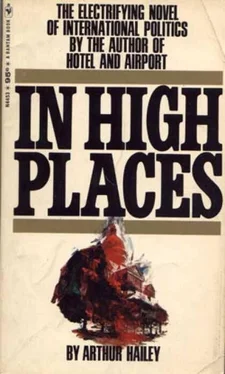Arthur Hailey - In High Places
Здесь есть возможность читать онлайн «Arthur Hailey - In High Places» весь текст электронной книги совершенно бесплатно (целиком полную версию без сокращений). В некоторых случаях можно слушать аудио, скачать через торрент в формате fb2 и присутствует краткое содержание. Жанр: Триллер, на английском языке. Описание произведения, (предисловие) а так же отзывы посетителей доступны на портале библиотеки ЛибКат.
- Название:In High Places
- Автор:
- Жанр:
- Год:неизвестен
- ISBN:нет данных
- Рейтинг книги:5 / 5. Голосов: 1
-
Избранное:Добавить в избранное
- Отзывы:
-
Ваша оценка:
- 100
- 1
- 2
- 3
- 4
- 5
In High Places: краткое содержание, описание и аннотация
Предлагаем к чтению аннотацию, описание, краткое содержание или предисловие (зависит от того, что написал сам автор книги «In High Places»). Если вы не нашли необходимую информацию о книге — напишите в комментариях, мы постараемся отыскать её.
In High Places — читать онлайн бесплатно полную книгу (весь текст) целиком
Ниже представлен текст книги, разбитый по страницам. Система сохранения места последней прочитанной страницы, позволяет с удобством читать онлайн бесплатно книгу «In High Places», без необходимости каждый раз заново искать на чём Вы остановились. Поставьте закладку, и сможете в любой момент перейти на страницу, на которой закончили чтение.
Интервал:
Закладка:
For a while, after the hearing had begun, misgiving had haunted Alan Maitland. He had feared that, despite everything, he might lose; that even at this late stage Henri Duval would be condemned to the Vastervik when it sailed tonight; that Senator Deveraux might believe, mistakenly, his blandishments had worked… But now a sense of assurance was returning.
Waiting for the present portion of argument to conclude, his thoughts switched to Henri Duval. Despite Alan's conviction that the young stowaway was a potentially good immigrant, the incident this morning in the hotel had left him disturbed. Uneasily he remembered Tom Lewis's doubts. 'A flaw somewhere; a weakness… maybe not his fault; perhaps something his background put there.'
It need not be true, Alan told himself fiercely; everyone, whatever his background, took time to adjust to new environments. Besides, the principle was what mattered most: personal liberty, the freedom of an individual. Once, glancing around the courtroom, he had found the eyes of Edgar Kramer upon him. Well, he would show this smug civil servant that there were processes of law more powerful than arbitrary administrative rulings.
The focus of arguments before the court had switched. Temporarily, A. R. Butler had resumed his seat, and now Alan sought to reopen old ground: the matter of the Immigration Department appeal following the special inquiry. At once A. R. Butler objected, but the judge ruled that the subject could be raised, then added casually, 'When convenient to counsel, I believe we might recess briefly.'
About to agree politely with the judge's suggestion, Alan had seen an expression of intense relief cross Edgar Kramer's face.-He had noticed, too, that for the past several minutes the civil servant had been moving, as if uncomfortably, in his high-backed chair. A sudden memory… instinct… made Alan hesitate.
He announced, 'With Your Lordship's permission, before recess I would appreciate completing this single portion of my argument.'
Mr Justice Willis nodded.
Alan continued to address the court. He examined the appeal proceedings, critici2ing the composition of the appeal board with its three members – including Edgar Kramer -fellow immigration officers of the special inquiry officer, George Tamkynhil.
Rhetorically he asked, 'Can it be anticipated that a group, so constituted, would nullify the findings of a close official colleague? Moreover, would such a group reverse a decision already announced in the House of Commons by the Minister of Immigration himself?'
A. R. Butler interjected heatedly, 'My friend is deliberately misinterpreting. The board is a board of review…'
The judge leaned forward. Judges were always touchy about administrative tribunals… It was something Alan had known. Now, his eyes on Edgar Kramer, he realized why he had delayed. It was a vicious impulse – a stroke of malice which, until this moment, he had not admitted to himself. Nor had it been necessary; he knew the case was won. Uneasily, he waited.
Through a tortured mental haze Edgar Kramer had heard the last exchange. He waited, pleading silently for it to end, praying for the recess the judge had promised.
Mr Justice Willis observed acidly, 'If I am to understand it, this so-called appeal from a special inquiry is nothing more than a department rubber stamp. Why in the world call it an appeal at all?' Fixing his gaze on Kramer, the judge continued austerely, 'I say to the representative of the Department of Citizenship and Immigration that the Court harbours grave doubts…'
But Edgar Kramer was no longer listening. The physical pain… the urge begun earlier and now intensified, was all consuming. His mind, his body could encompass nothing else. Brokenly, with anguish, he pushed back his chair and hurried from the courtroom.
'Stop!' It was the judge's voice, sharply commanding.
He paid no heed. In the corridor, still hastening, he could hear Mr Justice Willis bitingly addressing A. R. Butler. '…;
Warn this official… disrespect… any further occasion… contempt of court…' And then, abruptly: 'Court recessed for fifteen minutes.'
He could envisage the eager, crackling press stories which, in a moment or two, would be telephoned or written: Edgar S. Kramer, senior Immigration Department official, today was threatened with contempt of court proceedings during the British Columbia Supreme Court hearing into the case of Henri Duval. Kramer, while being addressed critically by Mr Justice Willis, walked out of court, ignoring an order by the judge…
It would appear everywhere. And it would be read by the public, colleagues, subordinates, seniors, the Minister, the Prime Minister…
He could never explain.
He knew that his career was over. There would be reprimands; and afterwards he would stay a civil servant, but without advancement. Responsibilities would grow less, respect diminishing. It had happened to others. Perhaps in his own. case there would be medical inquiries, early retirement…
He leaned forward, putting his head against the cool toilet wall, resisting an urge to weep bitter anguished tears.
Chapter 4
Tom Lewis asked: 'What comes next?'
'If you want to know,' Alan Maitland answered, 'I was just wondering myself.'
They were on the steps of the Supreme Court Building. It was early afternoon, warm, with unseasonal sunshine. Fifteen minutes earlier a favourable verdict had been handed down. Henri Duval, Mr Justice Willis ruled, could not be deported to a ship. Therefore Duval would not sail with the Vastervik tonight. There had been spontaneous applause in court, which the judge had subdued sternly.
Alan said thoughtfully, 'Henri isn't a landed immigrant yet, suppose eventually he could be sent directly to Lebanon where he boarded the ship. But I don't think the Government will do it.'
'I guess not,' Tom agreed. 'Anyway, he doesn't seem to be worrying.'
They looked across the steps to where Henri Duval was surrounded by a knot of reporters, photographers, and admirers. Several women were among the group. The former stowaway was posing for pictures, grinning broadly, his chest thrown out.
'Who's the sleazy character in the camel-hair coat?' Tom inquired.
He was watching a florid man with sharp, pock-marked features and oiled hair. He had a hand on Henri Duval's shoulders and was including himself in the pictures being taken.
'Some sort of night-club agent, I understand. He showed up a few minutes ago; says he wants to put Henri on show. I'm against it, but Henri likes the idea.' Alan said slowly, 'I don't quite see what I can do.'
'Did you talk to Duval about the job offers we have? The tugboat thing sounds good.'
Alan nodded. 'He told me he doesn't want to start work for a few days.'
Tom's eyebrows went up. 'Getting a little independent, isn't he?'
Alan answered shortly, 'Yes.' It had already occurred to him that certain responsibilities concerning his protege might prove an unexpected burden,
There was a pause, then Tom remarked, 'I suppose you know why Kramer went out of court the way he did.'
Alan nodded slowly. 'I remembered from the other time -what you told me.'
Tom said quietly, 'You rigged it, didn't you?'
'I wasn't sure what would happen,' Alan admitted. 'But I could see he was ready to blow.' He added miserably, 'I wish I hadn't done it.'
'I imagine Kramer does too,' Tom said. 'You fixed him, but good. I was talking to A. R. Butler after. By the way. Butler's not a bad guy when you get to know him. He told me Kramer is a good civil servant – hard-working, honest. If I may quote my learned friend, "When you consider what we pay civil servants, the Kramers of this country are a whole lot better than we deserve."'
Alan was silent.
Читать дальшеИнтервал:
Закладка:
Похожие книги на «In High Places»
Представляем Вашему вниманию похожие книги на «In High Places» списком для выбора. Мы отобрали схожую по названию и смыслу литературу в надежде предоставить читателям больше вариантов отыскать новые, интересные, ещё непрочитанные произведения.
Обсуждение, отзывы о книге «In High Places» и просто собственные мнения читателей. Оставьте ваши комментарии, напишите, что Вы думаете о произведении, его смысле или главных героях. Укажите что конкретно понравилось, а что нет, и почему Вы так считаете.












